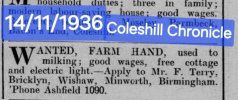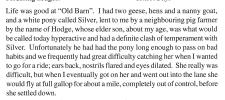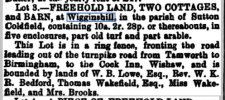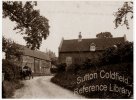-
Welcome to this forum . We are a worldwide group with a common interest in Birmingham and its history. While here, please follow a few simple rules. We ask that you respect other members, thank those who have helped you and please keep your contributions on-topic with the thread.
We do hope you enjoy your visit. BHF Admin Team
You are using an out of date browser. It may not display this or other websites correctly.
You should upgrade or use an alternative browser.
You should upgrade or use an alternative browser.
Old Barn, Wiggins Hill Road, Wishaw
- Thread starter Goayr Ben
- Start date
Baffled might not be quite the right word, more surprised. Francis bought the properties in 1938, carried out the alterations to knock them into one cottage, only to be sold in 1945 ? Seems a short stay for all that effort, especially at the time. But if they did emigrate, that could explain, and immediately after WW2 would make sense too. A better life on offer, especially as post-war Britain had a long recovery ahead. And more so in rural areas.
Last edited:
Goayr Ben
Not quite a Brummie
Hi! Viv
This may help to clear your baffles:
Frank was in a senior position with Dunlop at the time that he purchased the Old Barn.
In the mid 1940's Dunlop were setting up a tyre manufacturing plant near Christchurch New Zealand.
Maybe an offer too good to refuse Frank went out to New Zealand to help establish the plant.
I have a record of Blanche his wife following Frank out to New Zealand alone and aboard RMS Rangitiki sailing from London on 30th May 1946.
As I can't find a passenger record for Frank it is likely that Dunlop sent him by air
This may help to clear your baffles:
Frank was in a senior position with Dunlop at the time that he purchased the Old Barn.
In the mid 1940's Dunlop were setting up a tyre manufacturing plant near Christchurch New Zealand.
Maybe an offer too good to refuse Frank went out to New Zealand to help establish the plant.
I have a record of Blanche his wife following Frank out to New Zealand alone and aboard RMS Rangitiki sailing from London on 30th May 1946.
As I can't find a passenger record for Frank it is likely that Dunlop sent him by air
Last edited:
Absolutely - an offer that couldn't be turned down!! And thanks for the background.
So I take it that means the cottage and barn were mainly domestic premises (with a smallholding) and not intended for any contuinuing agricultural production use, presumably right from when Francis bought the buildings in 1938. Perhaps that backs up (I think mentioned earlier) speculation about the disposal of excess agricultural premises going back to when Francis bought the place.
So I take it that means the cottage and barn were mainly domestic premises (with a smallholding) and not intended for any contuinuing agricultural production use, presumably right from when Francis bought the buildings in 1938. Perhaps that backs up (I think mentioned earlier) speculation about the disposal of excess agricultural premises going back to when Francis bought the place.
Last edited:
Lovely ! It's always good to read memories of people who lived in places being researched.
With regards to Mr Terry., here he is looking for a milking farm hand and offering accommodation and electricity free. Wonder why it was free when good wages were offered. Maybe difficulty finding labour. Could it be Old Barn Cottage ? If so, this was only 2 years before it was sold.
Source: British Newspaper Archive
With regards to Mr Terry., here he is looking for a milking farm hand and offering accommodation and electricity free. Wonder why it was free when good wages were offered. Maybe difficulty finding labour. Could it be Old Barn Cottage ? If so, this was only 2 years before it was sold.
Source: British Newspaper Archive

Do you know if the cottage(s) were actually habitable when he bought the site? I expect the barn wasn't, of course.I ask this as it might have been empty for some time, and perhaps giving a reason for it's sale.
Last edited:
In your original post, Mary, you said you wanted to know more about the cottage(s)/barn. Do you have any particular aspects you want us to look at or focus on ?
Its been lovely exploring connections and the surrounding area, but I'm having trouble focusing because I find it all fascinating, especially in the context of the area it sits in and it's very rich history.
Its been lovely exploring connections and the surrounding area, but I'm having trouble focusing because I find it all fascinating, especially in the context of the area it sits in and it's very rich history.
pjmburns
master brummie
I misread that. Bricklyn is not in the same place as Old Barn.Lovely ! It's always good to read memories of people who lived in places being researched.
With regards to Mr Terry., here he is looking for a milking farm hand and offering accommodation and electricity free. Wonder why it was free when good wages were offered. Maybe difficulty finding labour. Could it be Old Barn Cottage ? If so, this was only 2 years before it was sold.
Source: British Newspaper Archive View attachment 193899
So my comment in post $73 doesn't make sense
I misread that. Bricklyn is not in the same place as Old Barn.
So my comment in post $73 doesn't make sense
thats what i thought jan..think i posted the 39 reg which puts mr terry at bricklyn farm bulls lane
lyn
Yes but it's not that far away. My thinking was they might well have had farm buildings in different places, away from the main farmhouse, positioned closer to certain fields. I was working on the basis that Mr Terry was at Bricklyn Farm but might have his worker cottage(s) furtther away.
Yes but it's not that far away. My thinking was they might well have had farm buildings in different places, away from the main farmhouse, positioned closer to certain fields. I was working on the info that Mr Terry was at Bricklyn Farm but his cottage(s) werefurtger away.
that is also possible viv...think bricklyn farm is now bricklyn cottages
Bricklyn Farm and Bricklyn Cottages are separate properties in Bulls Lane. Bricklyn Farm entrance is opposite Wishaw Lane. Bricklyn Cottages is actually one property on the opposite side of Bulls Lane around 100 yards down from Bricklyn Farm entrance. I was the rural postman in Bulls Lane for some years.
For info. Frederick Terry was "Councillor" Terry in 1937, obviously must have been a man of some influence in the area,. Bricklyn Farm was substantial (in acreage) - over 100 acres.
Last edited:
Does this advert dated 1884 indicate the cottages and barn were sold off much earlier than we thought?
View attachment 193933
that looks interesting jan
lyn
Richard Dye
master brummie
From the ‘street view’ the cottages look quite nicely situated.that is also possible viv...think bricklyn farm is now bricklyn cottages

Richard Dye
master brummie
Lyn, thank you, I’m good!richard if you read previous posts bricklyn farm is actually on the opposite side of the cottages further down the lane
lyn
Richard Dye
master brummie
The driver, top hat et al looks almost like a mortician or someone waiting to drive a brideHere's a photo of the Old Barn c1909 (left) from Sutton Coldfield Local History Research Group The fformer QuakerMeeting House is on the right. Wonder who the chap on the left is ?
View attachment 193934
Apparently marriages were carried out at the Quaker House It was fashionable for Birmingham Quaker couples to be married there. Spot on Richard !! Thanks.





